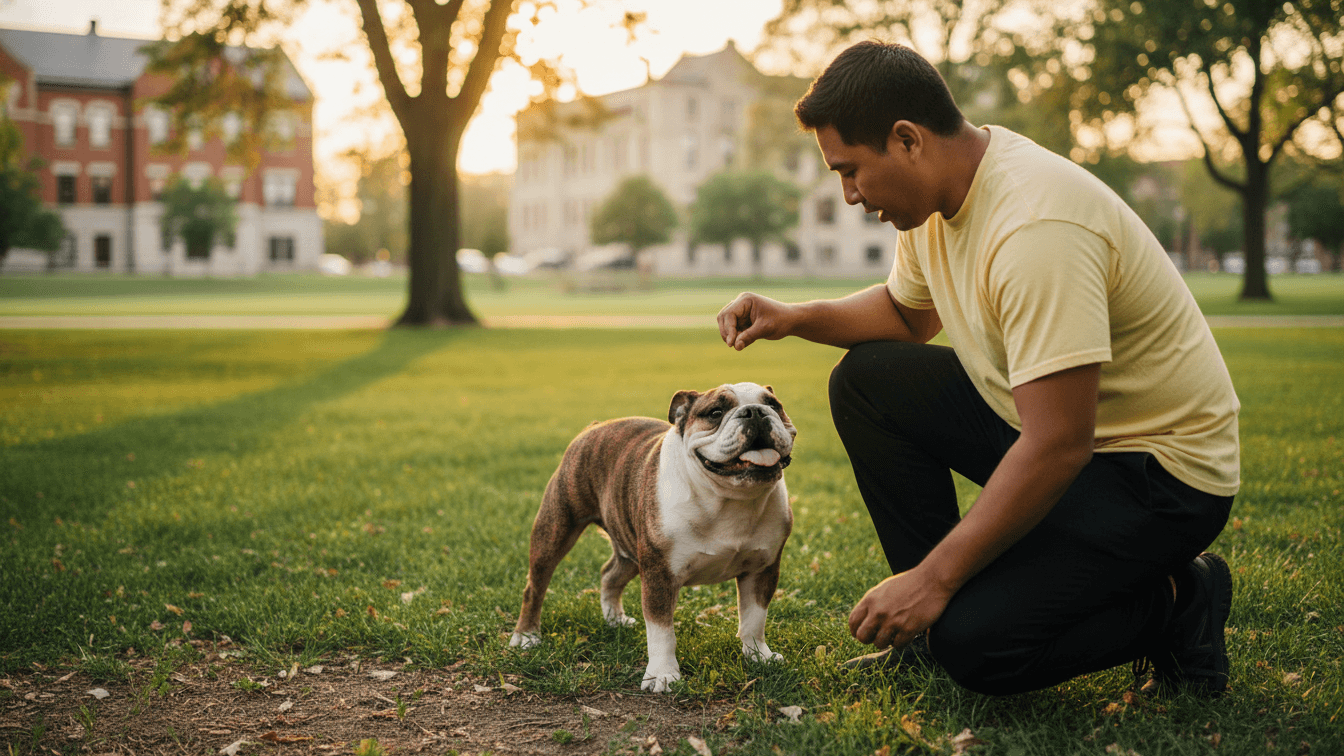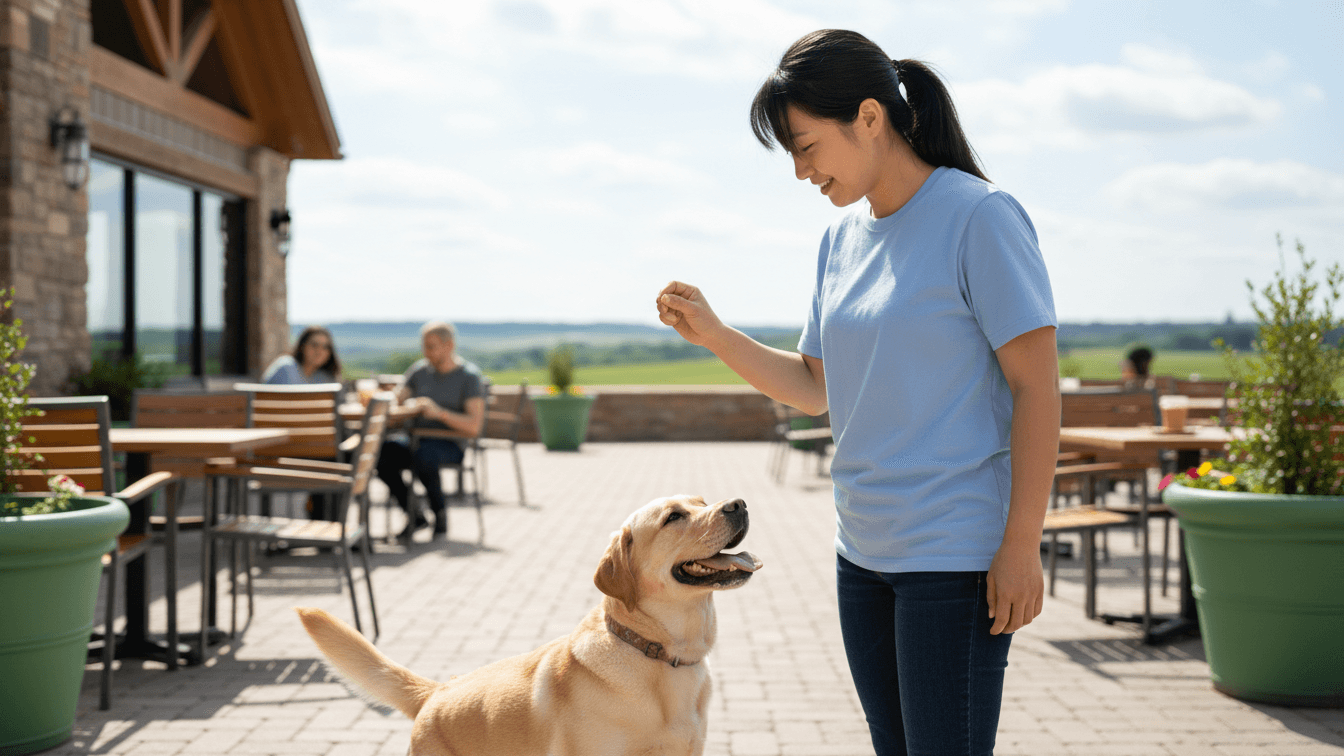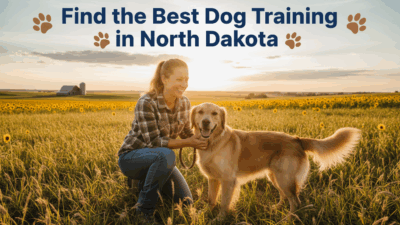Your Complete Guide to Choosing a Dog Trainer in North Dakota
Finding the right professional dog trainer in North Dakota means looking for someone who understands the unique challenges of life in the Peace Garden State. Your dog needs to handle the wide-open rural spaces, agricultural areas, and small-town environments that define much of North Dakota living. Whether you’re navigating main streets in towns like Fargo, Bismarck, Grand Forks, or Minot, or training a working dog on a ranch, the right trainer will help you build the skills your dog needs for your specific lifestyle.
North Dakota’s combination of rural landscapes, military bases, and tight-knit communities means your dog might encounter everything from livestock to snow-packed trails to summer outdoor festivals. A good trainer will help you prepare for these real-world situations with practical, reward-based methods that create lasting results.
How to Choose the Right Trainer
Start by identifying what you actually need to work on. Are you raising a ranch puppy who needs to learn boundaries around livestock? Do you have a rescue dog who struggles with reactivity in parking lots? Or maybe you just want solid basic obedience for everyday life around town. Being clear about your goals will help you find the best dog trainer for your situation.
Look for trainers who use positive reinforcement training methods and hold recognized credentials. Common dog trainer certifications include CPDT-KA, KPA-CTP, or CBCC-KA for behavior cases. If your dog shows serious aggression or fear, ask about advanced credentials like IAABC-CDBC or science-based programs like CTC.
In-home dog training works especially well in North Dakota because your trainer can address problems right where they happen. That might mean practicing recalls in your yard, teaching door manners when neighbors visit, or building confidence around farm equipment and livestock. Private lessons give you one-on-one attention for specific challenges.
Group classes make sense once your dog can focus around distractions. They’re great for socialization and practicing obedience around other dogs and people. Just make sure the class size stays small enough for individual attention, especially during North Dakota’s long winters when indoor space may be limited.
Common Dog Training Methods Explained

Reward-based methods build trust and create behaviors your dog will actually want to repeat. They’re also safer and more effective for the long term, which matters when you’re working with dogs who may encounter unpredictable situations on farms, trails, or around wildlife.
Basic obedience covers the foundation skills every dog needs: sit, down, stay, come, loose-leash walking, and place. These commands keep your dog safe whether you’re in town, on a hiking trail, or managing daily life on a ranch.
Puppy training sets up good habits from the start. Focus on socialization to different environments, potty training, bite inhibition, crate training, and early leash skills. North Dakota puppies benefit from careful exposure to both rural and urban settings so they can adapt to different situations as adults.
Behavior modification addresses problems like fear, separation anxiety, reactivity to dogs or people, and resource guarding. This specialized work requires a careful, systematic approach using desensitization and counterconditioning. For serious cases, look for trainers who collaborate with veterinarians and have experience with complex behavior issues.
Private lessons and in-home sessions let you customize everything around your daily routines and environment. Day training programs can speed up progress if you’re short on time, with the trainer working your dog during the day and then teaching you how to maintain the skills.
Dog training classes and group sessions help your dog learn to focus around distractions. The best classes screen participants carefully, give dogs enough space to feel comfortable, and teach calm, controlled behavior rather than just excitement.
Service dog training and therapy dog training require structured programs with clear benchmarks for public-access skills. If you’re training for these specialized roles, make sure your trainer has specific experience in that area and understands the legal requirements.
Avoid trainers who rely on fear, pain, or intimidation. These methods can create new behavior problems, damage your relationship with your dog, and may even violate North Dakota’s animal cruelty laws.
Average Cost of Dog Training in North Dakota and Surrounding Areas (Updated for 2025)
Training prices across North Dakota vary based on the trainer’s experience, location, session length, and the type of service you need. Here’s what most dog owners are paying in 2025.
| Service Type | Average Cost (North Dakota) |
|---|---|
| Puppy classes (4-6 weeks) | $120-$225 total |
| Group obedience classes (4-6 weeks) | $140-$250 total |
| Private lessons (60-90 min) | $90-$165 per session |
| In-home training packages (4-6 visits) | $350-$750 total |
| Day training (per week) | $400-$850 |
| Behavior consultation (initial) | $125-$225 |
| Board and train (2-4 weeks) | $1,800-$4,000 total |
Trainers in larger cities like Fargo and Bismarck may charge toward the higher end of these ranges, while those in smaller towns or rural areas may offer more affordable rates. Expect additional travel fees if you’re in a remote location.
Make sure you understand what’s included in the quoted price, how progress will be tracked, and whether the trainer offers a free consultation or free evaluation before you commit to a full training program.
Questions to Ask a Potential Dog Trainer
- What training methods do you use, and how do you handle dogs who are fearful or anxious?
- What credentials and certifications do you hold, and do you pursue continuing education?
- How will you customize the training sessions for my dog’s temperament and my specific goals?
- Do you offer in-home visits, group classes, or day training, and which approach fits my situation best?
- How do you measure progress and decide when my dog is ready for more challenging environments?
- What are your total costs, including any travel fees for my location, and what’s your cancellation policy?
- Do you carry liability insurance?
- For behavior problems, will you work with my veterinarian or recommend a veterinary behaviorist if needed?
- What will I need to practice between sessions to help my dog keep improving?
- Have you worked with dogs in rural or agricultural settings if that applies to my situation?
North Dakota Rules and Considerations for Dog Owners
North Dakota doesn’t have statewide leash laws, but most cities and towns enforce their own local ordinances requiring dogs to be leashed or under control in public spaces. Check with your city or county for specific requirements.
The North Dakota Century Code addresses animal control and nuisance laws. Local authorities can issue citations for dogs that repeatedly run at large, create disturbances, or pose safety threats. Training your dog to respond reliably to commands helps you stay compliant and keeps your neighbors happy.
North Dakota requires rabies vaccination for all dogs. The North Dakota Department of Health and Human Services oversees rabies control, and you can find current information on their website. Keep your dog’s vaccination records current and the rabies tag on their collar.
Excessive barking can be considered a nuisance under local ordinances. If your dog has separation anxiety or alert-barking issues, work with your trainer to address these problems before they become legal concerns.
North Dakota doesn’t require special licenses or certifications for dog trainers. Trainers operate under general business regulations. If a trainer offers board and train services or operates a kennel, they may need to comply with local zoning and animal care facility requirements, but there’s no state-level trainer licensing.
Some cities require dog licenses. Contact your local city hall or county office to find out if registration is required in your area.
Local North Dakota Resources for Dog Owners
These locations give you good opportunities to practice training skills, provide safe enrichment, and help your dog learn to navigate different environments. Always follow posted rules and local etiquette guidelines.
- Gateway to Science Dog Park in Bismarck offers a fenced area where dogs can practice off-leash recalls and social skills in a safe environment.
- Lindenwood Park Dog Park in Fargo provides separate areas for large and small dogs, making it easier to practice calm greetings and focus work.
- Red River State Recreation Area near Fargo welcomes leashed dogs on trails, giving you excellent opportunities to work on loose-leash walking and focus around wildlife and other visitors.

FAQs
How much does in-home dog training cost?
Most North Dakota trainers charge $90-$165 per in-home visit. Package deals that include four to six sessions typically range from $350 to $750 total. Behavior modification work for serious issues usually starts at the higher end of that range.
Is in-home dog training worth it?
Yes, especially in North Dakota where your dog’s environment plays such a big role in daily life. In-home sessions let your trainer address problems exactly where they happen, whether that’s door manners when visitors arrive, reactivity to farm equipment, or teaching your dog to settle calmly indoors during long winter months.
Can you pay someone to house train your dog?
Yes, many trainers offer puppy programs that include potty training, crate routines, and daily schedules. Day training can speed up the process while teaching you how to maintain consistency. This is especially helpful during North Dakota winters when weather makes outdoor trips more challenging.
What is the 3-3-3 rule for dog training?
This guideline helps you understand what to expect when bringing home a new or adopted dog. Plan for about three days for your dog to decompress, three weeks to learn your routines, and three months to feel fully settled. A good training program works with this natural adjustment timeline rather than rushing results.
How long will it take to reach my training goals?
Most puppies and friendly adult dogs show solid progress within four to eight weeks if you practice consistently. Behavior problems like fear, reactivity, or aggression typically require several months of careful work with gradual increases in difficulty. Your trainer should give you a realistic timeline based on your specific situation.
What should I bring to group classes?
Pack a flat collar or harness, a six-foot leash, high-value treats, water, and your dog’s current vaccination records. Leave retractable leashes at home since they make it harder to maintain control in a group setting.
What’s the leash law in North Dakota?
North Dakota doesn’t have a single statewide leash law. Most cities and towns have local ordinances requiring dogs to be leashed or under effective control in public areas. Check with your city or county for specific rules in your area.
Do I need a dog license in North Dakota?
Requirements vary by city and county. Some North Dakota communities require dog licenses while others don’t. Contact your local city hall or county office to find out what’s required where you live.
What shots does my dog need in North Dakota?
Rabies vaccination is required by North Dakota law for all dogs. Your veterinarian will likely also recommend distemper, parvovirus, and bordetella vaccines depending on your dog’s lifestyle and exposure risks. The North Dakota Department of Health and Human Services provides guidance on rabies requirements.
Are dog trainers required to be licensed in North Dakota?
No. North Dakota doesn’t require special licenses or certifications for dog trainers. Trainers follow normal business regulations. If they offer boarding services as part of board and train programs, they may need to meet local zoning and animal care facility requirements, but there’s no state-level credential requirement for training services.
Where can I practice off-leash recall?
Use fenced dog parks where off-leash activity is permitted and legal. Gateway to Science Dog Park in Bismarck and Lindenwood Park Dog Park in Fargo both offer fenced areas. You can also use private property with the owner’s permission or long-line leashes on trails where dogs must remain leashed.
Which dog parks allow training around North Dakota?
Most dog parks allow training as long as you follow posted rules and don’t interfere with other visitors. Gateway to Science Dog Park in Bismarck and Lindenwood Park Dog Park in Fargo are both popular options where you can work on recalls, socialization, and calm greetings in a controlled environment.
What trails allow dogs for training?
Red River State Recreation Area near Fargo welcomes leashed dogs on trails. Theodore Roosevelt National Park allows leashed dogs in developed areas, campgrounds, and along roadsides, though not on backcountry trails. These locations provide excellent real-world distractions for practicing loose-leash walking and focus work. Many city parks across North Dakota also allow leashed dogs on walking paths.
What if my dog is aggressive toward livestock?
North Dakota law allows livestock owners to protect their animals, so managing aggression toward livestock is critical if you live in a rural area. Work with a certified dog trainer who has experience with predatory drift and livestock boundaries. This type of training for dogs requires careful management and may involve working with a veterinary behaviorist for the best results.
Can I train my own service dog in North Dakota?
Yes, North Dakota law allows owner-trained service dogs. However, the dog must be individually trained to perform specific tasks related to a disability. Consider working with expert dog trainers who specialize in service dog training to ensure your dog meets public-access standards and can perform reliably in all environments.
The right combination of humane training methods, consistent practice, and an understanding of North Dakota’s unique environment will help you raise a well-behaved dog who can handle everything from small-town life to wide-open rural spaces. Whether you’re looking for help your dog master basic manners or need specialized behavior modification, working with a professional who uses positive reinforcement will set you both up for long-term success.
